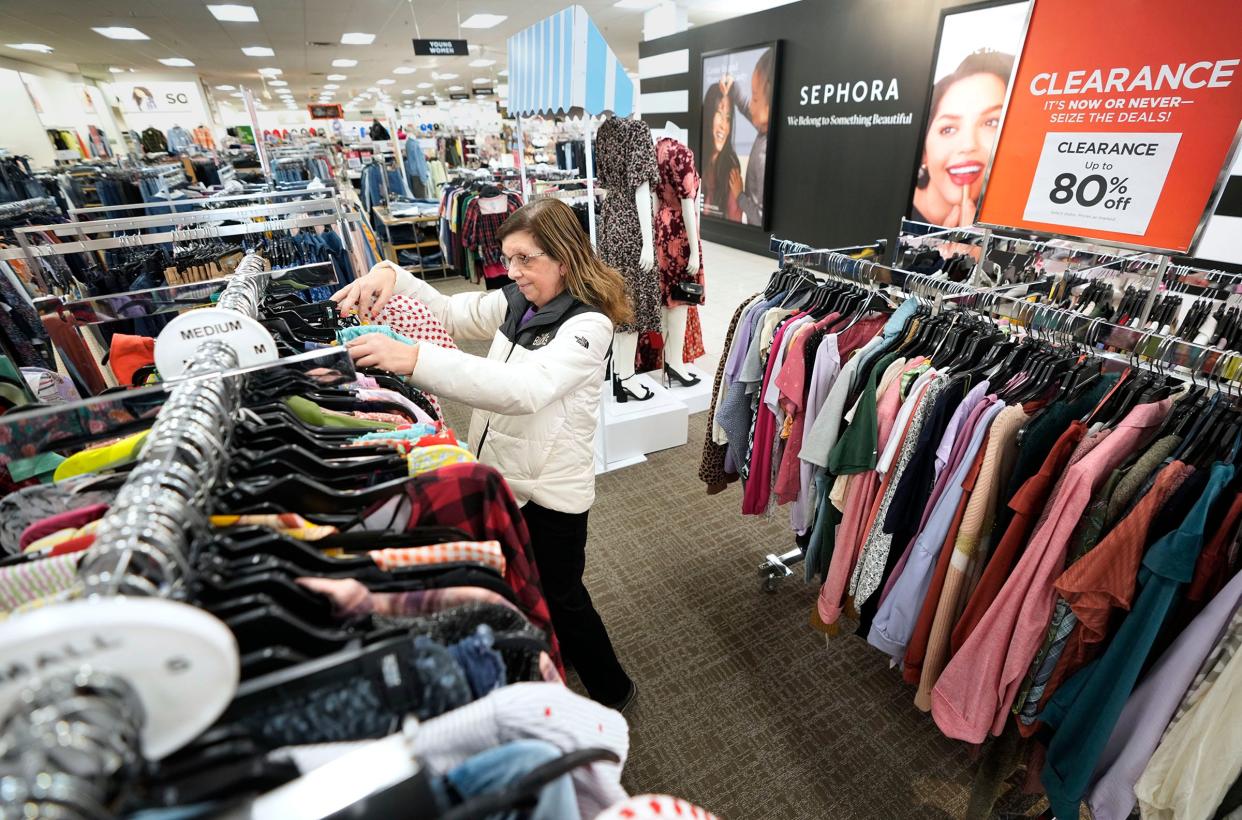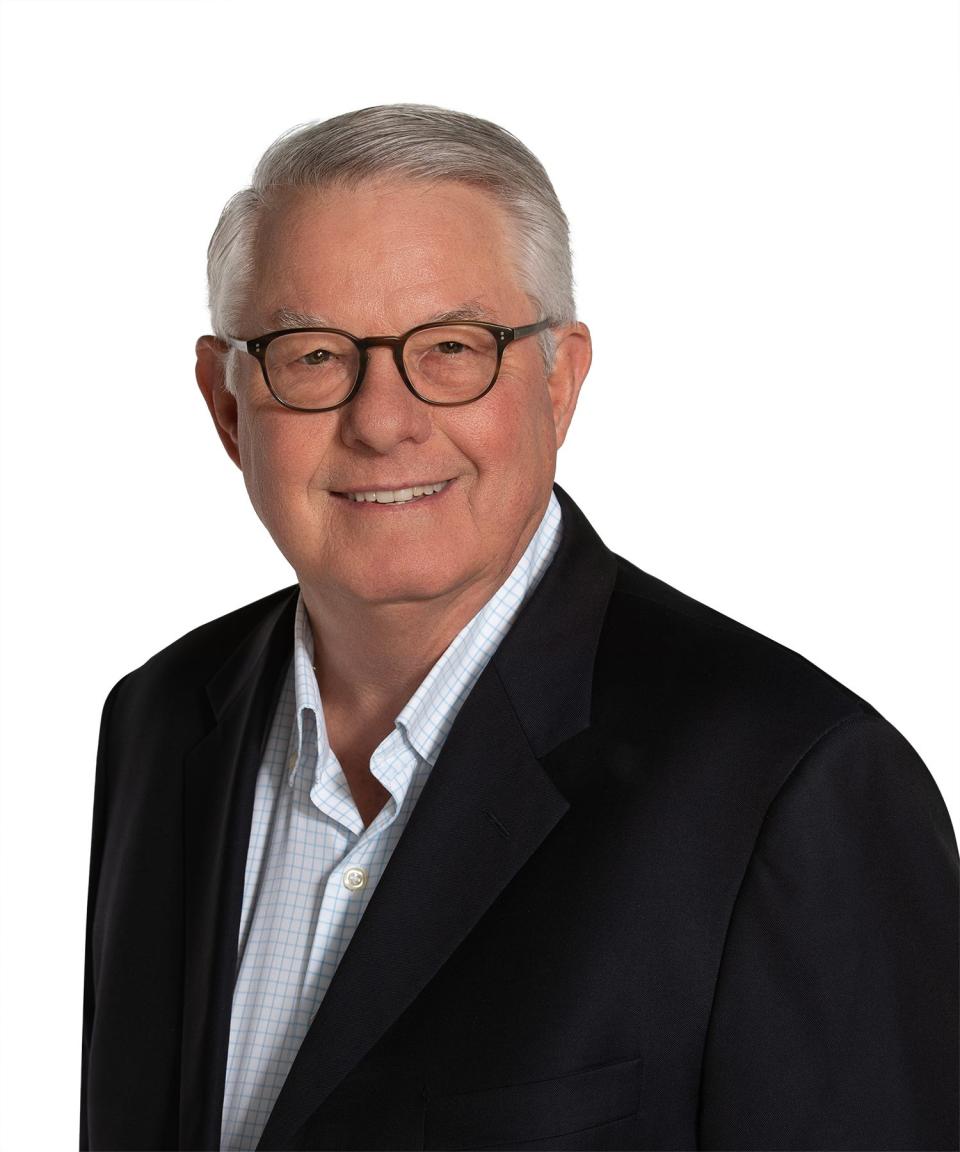Kohl's Corp. enters 2023 with 'identity crisis' after rough 2022. What's next for the retailer?

Kohl’s Corp. has entered the year as a beaten and bruised company and the hits might keep coming.
Analysts and observers expect another difficult year for the Menomonee Falls, Wisconsin-based retail chain and say the company's new leadership could face another fight with activist investors.
Kohl’s is coming off a tumultuous year that saw the company withdraw its guidance to investors, sales decline more than 7%, the departure of the CEO, and a fight over the board of directors.
The company also instituted a $500 million stock buyback program to keep the share price afloat. Kohl's shares have been trading recently at about $30 per share – about half the price of a year ago.
Perhaps most critical, is the search for a new CEO after Michelle Gass left for a job at Levi Strauss Co. For now, the company is being led by an interim CEO Tom Kingsbury.

“A lot of things have actually changed in the last 12 months since the last proxy battle was started,” said David Swartz, analyst with Morningstar Research Services.
“A year ago Kohl’s was coming off a strong year in 2021 and this year they’re coming off a very mediocre year in 2022. That will have an impact if another proxy battle comes around, which I expect it will.”
A 'completely uncertain' future
Mark Cohen, director of retail studies at Columbia University who also was CEO of Sears Canada, said the future of Kohl’s “is completely uncertain.”
“They’re stuck,” Cohen said. “They’re not dead because they’re still profitable. But they’re stuck. And it’s anybody’s guess what next steps are going to be with regard to current management and (Wall Street's) view of the future.”
Kingsbury and Kohl's board president Peter Boneparth declined to be interviewed for this story.
Kingsbury nominated to board by activist investors
The fight for control of the company began two years ago when a group of activist investors including Macellum Capital Management wanted to get control of the board.
Kohl's convinced the activist investors to agree to expand the board by three seats and allowed them to nominate candidates for two of the three seats.
Kingsbury was one of those nominated by activist investors.
“I can’t really call this a win for them because it doesn’t look like Kingsbury is going to do or even has any interest in doing what (activist investors) want him to do,” Swartz said. “They liked his background since he was a former CEO of Burlington, which to be honest, has been much more successful than Kohl’s and has a bigger market cap.”
Margaret Hughes-Morgan, associate professor of management at Marquette University with experience on Wall Street, believes the departure of Gass and the promotion of Kingsbury, albeit in an interim role, is “absolutely a win for the activist investors.”
“I would be surprised if there isn’t a significant amount of cost-cutting and that they start really trying to generate revenue and get the stock price back up,” Hughes-Morgan said.
Swartz doesn’t believe Kingsbury will break from the company’s plans.
“He wouldn’t have been chosen as interim CEO by the board if that was likely to happen,” Swartz said. “The board wouldn’t want to promote someone to the interim CEO position who’s actually going to be actively fighting against the board.”
Will Kohl's close stores in 2023?
Among the many adjustments that people made during the coronavirus pandemic was online shopping. The pandemic had a dramatic impact on brick-and-mortar retail stores and escalated store closings for businesses that were already struggling.
Department stores like Macy’s and Nordstrom have already announced some store closings but Swartz does not believe Kohl’s will follow.
“That could certainly change, especially with a new CEO coming in,” Swartz said. “Kohl’s has consistently said that something like 99% of its stores are profitable on a four-wall basis so it does not need to downsize. There’s always a possibility of one or two stores closing due to lease expirations or something like that, but there hasn’t been a deliberate effort to close stores since 2016.”
Partnership with Sephora
Kohl’s’ plan to raise revenue rests mostly on its partnership with Sephora, which the company believes could be a $2 billion business and hundreds of smaller regional stores are flexible and offer specific merchandise for the local markets.
Nearly every Kohl’s store now has a Sephora after the company invested millions in the partnership, but it’s unclear what impact the addition will have.

“It doesn’t really work unless people come in to shop at Sephora and then also shop at the rest of the Kohl’s store and that’s what we don’t know right now,” Swartz said. “Realistically, you have to look at JC Penney. There were Sephora shops in JC Penneys for years and it did not prevent JC Penney from going bankrupt.”
Cohen said the partnership with Sephora is a “powerful and important deal.”
“Sephora did reasonably well at JC Penney. JC Penney did not do well having Sephora in several hundred of its stores,” Cohen said. “The customer that was shopping at Sephora was also not shopping with abandon at JC Penney. And I suspect the same thing is going to happen at Kohl’s.”
Cohen said Kohl's could have done a better job rolling out Sephora.
“I’m not so sure that the company had the skill set with which to properly integrate Sephora other than plant it in the store, in the front of the store,” Cohen said.
And with Target bringing Ulta into its stores, it makes the task of being more appealing difficult.
“Ulta is a strong competitor. Ulta has been taking market share from department stores like Kohl’s for years,” Swartz said. “Going into Target will rapidly increase their exposure.”
Smaller, localized stores plan
Last year, under Gass, Kohl’s unveiled a plan to open 100 new smaller stores over the next four years.
“The reality is this is a company with 1,160 stores. Even if they add 50 small stores, the actual impact will be limited,” Swartz said. “And their sales are going to be smaller because they’re smaller stores... and we don’t even know how quickly these stores will be opened.”
The idea is what might work in the Midwest might not work in the south and vice versa. The first pilot store was launched in a community outside of Seattle.
“If you haven’t got your baseline assortments correct, how the hell are you going to come up with an edited version of it that’s going to be of appeal,” Cohen said. “Why locate a prototype in a suburb of Seattle unless you’re trying to pimp your business with regards to its attractiveness to Amazon... clearly Gass was trying to convince Amazon to buy Kohl’s.”
Kohl's is also planning on opening a smaller store in downtown Milwaukee later this year.
If Kohl’s was more serious about the smaller stores, Cohen said, the company would have put the first one closer to the headquarters in Menomonee Falls where it could be closely examined and have some oversight by the company.
“You don’t mount it on the other side of the country. That’s just stupid.” Cohen said.
The rollout of these stores is still in the very early stages so it’s unclear if or how they will have an impact on the company.
“Macy’s is doing a similar thing. Macy’s is also opening smaller stores. Which is kind of a bummer for Kohl’s because it means even this plan is facing new competition,” Swartz said. “Macy’s and Kohl’s sort of have the same problem, which is their stores are too big.”
Kohl’s suffers from lack of identity
When Cohen was running Sears Canada, more than 15 years ago, he was approached by Kohl’s executives about possibly joining the company.
He turned them down.
“I’ve been critical of Kohl’s,” Cohen said. “One of the reasons why I didn’t accept their invitation to join them was the fact that they had long ago overplayed their hand promotionally. Which is to say they put their entire assortment on sale on a continuous basis... without regard to their stores being increasingly cluttered, difficult to shop, and unfocused.”
Cohen said the promotional strategy they were driving “ran out of gas.”
“You can only have 52 promotional events a year of any consequence because that’s how many weeks there are, that’s how many Sundays there are,” Cohen said. “And Kohl’s, of course, long ago started practicing the double drop strategy, which is an event on Sunday and another one on Wednesday. So there’s only 100 opportunities to shout about promotionally and that runs out at some point.”
Cohen said as other stores closed in recent years, Kohl’s stepped in to replace them without having to drastically change its strategy.
“They got tremendous benefit from the decline and eventual disappearance of Mervyn’s and of Goody’s. The serial decline of JC Penney and the long-running decline of Macy’s,” Cohen said. “For many years they looked like they were successful when in fact a lot of what their success was being driven by was market share that other organizations were giving up.”
A year ago, Kohl’s stock was trading around $46 per share, then a rumor of the company potentially having a buyer leaked and the stock shot up to roughly $62 per share.
Kohl’s considered selling to Franchise Group but talks fell apart in July and the stock has yet to recover.
“Activist investors tend to have a short-term outlook, by their very nature. Obviously, they’re in it to make a quick buck,” Hughes-Morgan said. “But Kohl’s has an identity crisis. This has been going on for a while. They don’t know who they are.”
“Are they an upscale Target? Are they simply a brick-and-mortar store to showcase other people’s brands like Sephora? They need to figure out that and they need to figure out the ‘why.’ Why are customers coming to them? From what I can see, they don’t really have a competitive advantage of any kind.”
Hughes-Morgan said Kohl’s’ partnerships with Sephora and Amazon, to return packages, were good moves to draw in customers. But what’s next?
She called Target “masterful merchandisers” and beyond its brand products, also sells grocery items.
“You go into the store, it’s big and bright and easy to get around,” Hughes-Morgan said. “You’re able to find what you’re looking for. One of the things that Target does really well is these designer collaborations. They create excitement around the store. There’s a Starbucks in there. Target also sells food. Now, I don’t see Kohl’s going in that direction, but who knows? People have a reason to want to go to Target.”
There are always other outside factors that a company can’t control when it comes to consumer spending. The pandemic in 2020 and high inflation in 2022 had huge a huge impact on how much people spend and were definitely out of the control of businesses.
Hughes-Morgan said consumers are being left with mostly two options: high-end stores that offer premium products or cheaper, budget stores that will give customers what they need.
“The middle class is getting to the point where their budgets are so stretched they don’t have a whole lot of discretionary income anymore,” Hughes-Morgan said.
“Part of the problem with some of this department stores that cater to the middle class is they don’t really have a catch... Why am I going to go to Kohl’s? They give me $5 in Kohl’s cash, so I go look around and find something and I spend $5. What’s drawing me in?”
This article originally appeared on USA TODAY: Kohl's Corp. enters 2023 on shaky ground after rough 2022

